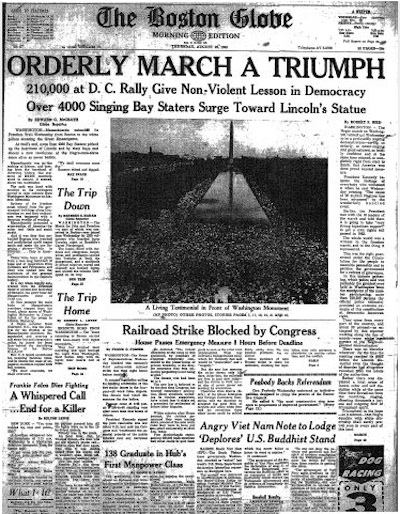How Boston Read News of the March on Washington
It’s interesting to recall on this 50th anniversary of the March on Washington that though the events were national in import and impact, they were felt by most Americans locally. Bill Clinton, speaking at today’s ceremony in Washington, reminded us of that when he recalled how Martin Luther King Jr.’s speech moved millions, including “a 17 year old boy watching alone in his home in Arkansas.” (Watch MLK again today, if you have a moment. If you’re like this guy, it’s been too long.)
The Boston Globe reminded us of it too today, when they posted their front page from August 29, 2013, one day after 200,000 people descended on the National Mall to demand equality.
Reading the lead story in the archives, Globe reporter Edward G. McGrath’s task that day seems to have been to stroke the ego of the Massachusetts readers accustomed to a starring role in history. His piece begins:
Massachusetts extended its Freedom Trail Wednesday from Boston to the white pillars encasing the Great Emancipator.
At trail’s end, more than 4000 Bay Staters picked up the heartbeat of Lincoln and by their tears and cheers a new revolution of the Negro-once-slave came alive as never before.
Massachusetts was in the making of history, and coming from the heartland of American history, this segment of 200,000 marchers stood in stature, it seemed, above the multitudes.
The logic there, that the Massachusetts delegation somehow rose above those from the other states because they arrived from the “heartland of American history,” seems a little rich, and utterly Bostonian. Massachusetts saw momentous things happening, and then as now, we wanted our proper place in it.
Elsewhere in the paper, columnists, the editorial board, and analysts predicted that the March would prove persuasive. Columnist Roscoe Drummond wrote on the August 30, 1963 opinion page:
The consensus in Washington is that their petition will be heeded. The results in law and in climate will not be instant, but the effect of this momentous and moving rally will be visible in the weeks to come.
As a concluding aside, there’s some kind of amusing poetry in the fact that the letter to the editor that ran just below Drummond’s column that day, which predicted rapid change in America, was titled “An Indictment of Boston Motorists.” (” I recently had occasion to visit Massachusetts. While there, I experienced some of the worst traffic and driving habits I have ever seen,” wrote a disgruntled Silver Spring man.) How far you think race relations have come in 50 years after that march is a big question—one explored by many of today’s speakers. But hey, 50 years later and some things—like our historical ego and unwelcoming roads—never change.



